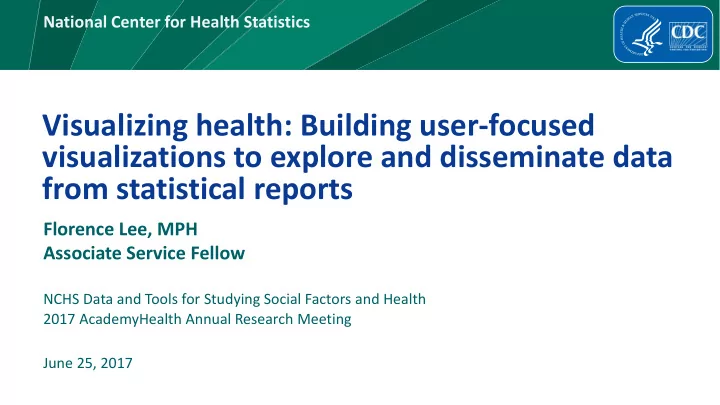

National Center for Health Statistics Visualizing health: Building user-focused visualizations to explore and disseminate data from statistical reports Florence Lee, MPH Associate Service Fellow NCHS Data and Tools for Studying Social Factors and Health 2017 AcademyHealth Annual Research Meeting June 25, 2017
HEALTH, UNITED STATES SPOTLIGHT Infographic delivering from complex tables to a non-technical audience
HEALTH, UNITED STATES DHHS Secretary’s annual report on the nation’s health, submitted to the President and Congress Targeted to policymakers and academics Encyclopedia of health data spanning four subject areas: 27 Chartbook figures 114 trend tables w/data from government, private, and international sources Detailed technical notes and appendix entries
HEALTH, UNITED STATES : Trend tables
HEALTH, UNITED STATES : Trend tables
HEALTH, UNITED STATES : Detailed technical notes Important variable definitions Information about the data source
HEALTH, UNITED STATES : Chartbook figures
HEALTH, UNITED STATES : Description of trends
HEALTH, UNITED STATES : Comparison across groups
VISUALIZATION RESULTS: Health, United States Spotlight Selected Health Indicators Health Status & Health Care Expenditures Health Care Utilization & Determinants & Payers Resources February 2016 June 2016 September 2016 April 2017
VISUALIZATION RESULTS: Infographic features
VISUALIZATION RESULTS: Infographic features About the Data Panel Links to the data source Provides information from the appendices and table notes – Respondent population – Variable definitions
VISUALIZATION RESULTS: Infographic features Trends Panel Illustrates significant changes in the trend (Stable, Increase, Decrease) based on Joinpoint analysis Uses a dot to indicate the presence of a joinpoint
VISUALIZATION RESULTS: Infographic features Data Highlights Illustrates differences by selected characteristics Includes graphics that are familiar to a non-technical user
DESIGNING FOR DISSEMINATION Screenshots of infographic modules were used to enhance Tweets. The Medicaid Coverage module here provided images for six Tweets. Three are shown here.
RURAL HEALTH DATA PRODUCTS Interactive data visualizations to guide exploration and decision-making
Suite of Dissemination Products for Rural Health CDC policy- focused commentary Supplemental tables User-focused data and maps visualization CDC Rural NCHS data-focused User-focused Health paper webinars MMWR
NCHS Data-Focused Paper CDC Policy-Focused Commentary “Leading Causes of Death in Nonmetro and Metro “Reducing Potentially Excess Deaths from the Five Areas — United States, 1994 –2014” Leading Causes of Death in Rural United States”
Rural-urban disparities have grown even though age- adjusted deaths from heart disease & cancer have fallen. Heart Disease Cancer 300 300 Rate per 100,000 Population Rate per 100,000 Population 250 250 200 200 150 150 100 100 Nonmetropolitan 50 50 Metropolitan 0 0 1999 2004 2009 2014 1999 2004 2009 2014
Unintentional injury death rates have increased in parallel. Chronic lower respiratory disease rates have diverged. Unintentional Injury Chronic Lower Respiratory Disease 100 100 Rate per 100,000 Population Rate per 100,000 Population 75 75 50 50 25 25 Nonmetropolitan Metropolitan 0 0 1999 2004 2009 2014 1999 2004 2009 2014
Percentages of observed deaths that are potentially excess are higher in rural than urban areas. 100% Nonmetropolitan Metropolitan 80% % Potentially Excess 57% 54% 60% 43% 39% 38% 40% 31% 28% 26% 24% 20% 13% 0% Heart Disease Cancer Unintentional Chronic Lower Stroke Injury Respiratory Disease
Suite of Dissemination Products for Rural Health CDC policy- focused commentary Supplemental tables User-focused data and maps visualization CDC Rural NCHS data-focused User-focused Health paper webinars MMWR
Drilling Down to the State x Locality Level
Drilling Down to the State x Locality Level
Prioritizing at the Region x Locality Level
CONTACT INFORMATION Florence Lee flee2@cdc.gov 301-458-4694 For more information, contact CDC 1-800-CDC-INFO (232-4636) TTY: 1-888-232-6348 www.cdc.gov The findings and conclusions in this report are those of the authors and do not necessarily represent the official position of the Centers for Disease Control and Prevention.
Recommend
More recommend